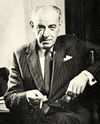The Arena (novel)
Authors [about]:
join in to develop this article! |
The Arena is a 1961 suspense novel by the British author William Haggard published in England by Cassell and in the United States by Washburn. It was Haggard's third of 21 books involving his protagonist Colonel Charles Russell, the head of the unobtrusive but lethal Security Executive, a government counter-intelligence agency, where he moves easily and gracefully along C.P. Snow's Corridors of Power. Like all of the other works by Haggard it is a standard novel of suspense, but combined, as usual with Haggard, with other elements: the reactions of those in high government positions who fear non-political events that could endanger Britain's place in the world, along with a tough-minded, even cynical depiction of financial shenanigans in the City of London.
Plot
Protagonist is perhaps too strong a word to describe Colonel Russell. As Haggard himself wrote about his fiction:
My novels are chiefly novels of suspense with a background of international politics. A Colonel Charles Russell of the Security Executive, a not entirely imaginary British counter-espionage organization, while not a protagonist in the technical sense, holds the story line together in the background by his operations, while the characters in the foreground carry the action."[1]
References
- ↑ From the back flap of the dust jacket of the Walker and Company American edition of The Conspirators, New York, 1967
and some by his near contemporaries Victor Canning and Michael Gilbert,
